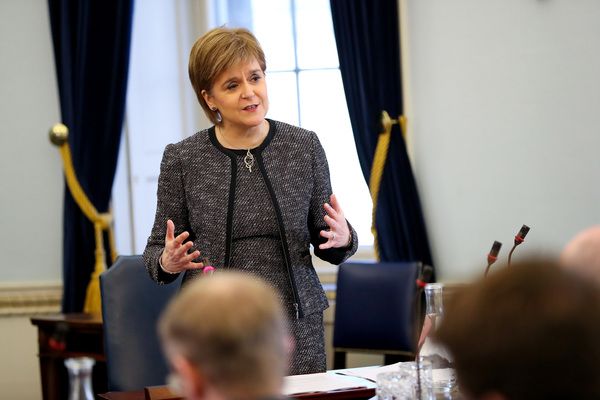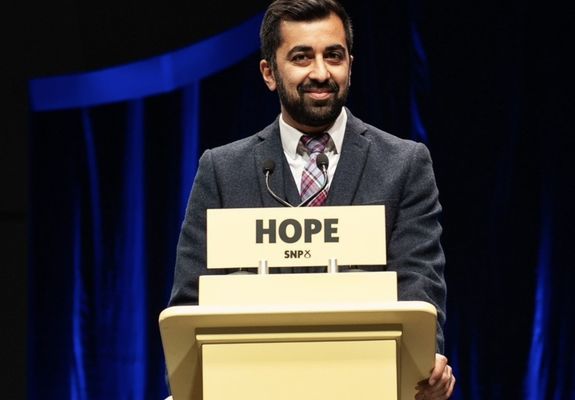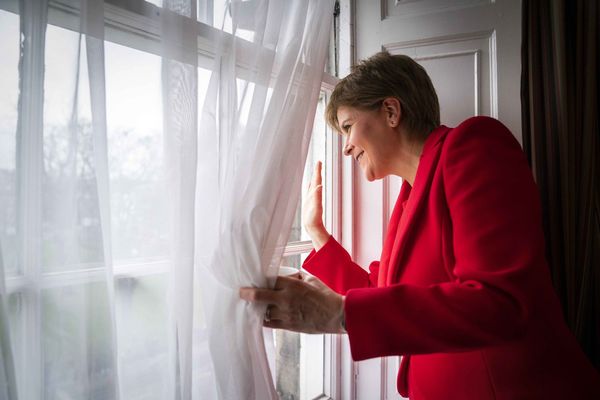BARELY six months have passed since Nicola Sturgeon won another five years of power in Edinburgh. Her SNP – and its Scottish Greens allies – again hold more than half of the the seats in Holyrood, the country’s parliament.
An opinion poll last week – albeit dubbed an “outlier” – put support for independence as high as 55%.
The First Minister’s personal ratings remain high, even if not quite as stratospherically so as they once were. Meanwhile, in the latest survey, for Ipso-Mori, her strategic adversary, Boris Johnson, hit an all-time low.
Just 16 per cent of Scots think the Prime Minister is doing a satisfactory job. Eighty per cent – including a majority of Conservative voters – say he is not.
Sturgeon as recently as last month told her party faithful to prepare for a new referendum within little more than two years, Covid allowing.
You might, therefore, assume that independence supporters are buzzing with excitement and that international observers are preparing for a huge vote that could end the United Kingdom as we know it.
New column: @LordMcConnell is right - Scotland is stuck, and it’s a national tragedy https://t.co/yrVSOOtWgd
— Chris Deerin (@chrisdeerin) November 18, 2021
They are not. Why? Because the reality is that Scotland is, to use a term being bandied around the country this last wee while, “stuck”, mired in a constitutional impasse. For now, at least.
Even some of her smarter supporters will admit privately that Ms Sturgeon’s campaign for independence has effectively stalled.
And not just because a global pandemic has frozen all other politics.
The bottom line: however high the SNP fly in the polls, Johnson and his Conservative government are not budging from their opposition to a referendum. Sturgeon will not get a repeat of the so-called “gold standard” plebiscite Scotland held in 2014, with UK and Scottish authorities agreeing to respect the result. Not any time soon anyway.
All sides – a decade ago – called this the “gold standard”. Some argue about the legal niceties, about whether the SNP and Greens really need the say-so of Johnson, to hold another vote.
But this is not a matter of law, this is politics, including global politics. Key partners, not least those in the EU, will only readily accept an independent Scottish state born from a politically agreed process.
So there was some cynicism when Sturgeon told a virtual party conference at the end of November that next spring she would start preparations to hold what Scottish political nerds call indyref2 by the end of 2023.
“If it feels like déjà vu, that’s because it is,” said Gina Davidson, political commentator, on LBC. “Much has been written recently about how Scotland is stuck in a constitutional loop, endlessly waiting for a second referendum and its outcome before it can move on any of the pressing issues facing Scots, but the fact is that the SNP is stuck too.”
▪️ Independence support at 55%
— STV News (@STVNews) December 1, 2021
▪️ Record-low approval rating for Boris Johnson
▪️ Mixed views on Scottish Government performance
New poll for @STVNews by @IpsosMORIScot: https://t.co/SIHqCaOZ4Q pic.twitter.com/EIBYdr28g4
This impasse is not all bad news for Sturgeon and her party. There is a whole school of thought that polarised constitutional politics can keep the SNP in power even if it does not move any closer to its goal of independence. The logic of this argument. There is a huge pro-indy block vote that will keep turning out to support the SNP whatever happens.
As James Mitchell, a politics professor at Edinburgh University, wrote earlier this month, such voters are not necessarily swayed by bad performance. He had a point. The same Ipsos-Mori poll which put Yes ahead had the SNP on 53% for first-past-the-post seats. Yet those surveyed expressed net dissatisfaction with government performance on health and education, arguably the two most important portfolios of devolved power.
The SNP, in other words, is “stuck”, but in perpetual power as much as in a constitutional logjam.
It was Jack McConnell, the Labour peer and the last unionist leader of Scotland, who first made the point. Speaking to Holyrood, the magazine rather than the parliament, the former First Minister argued that Scotland had failed to move on since 2014.
“Public discourse in Scotland has got us to a stage where there is no potential in the immediate future, I don’t think, to change any of the policies or the delivery in areas where things could be improved, because all we are doing is waiting for the next referendum,” McConnell said. “There’s a lack of accountability. There’s a lack of, let’s be honest, real discussion.
Sturgeon: Independence campaign to restart in the spring to hold 2023 referendum https://t.co/PfITlFyERm
— Tom Gordon (@HTScotPol) November 29, 2021
“If somebody makes a comment, positive or negative, about either the Scottish Government or the UK Government or about any public service or legislation or issue, then what they say is immediately categorised by where they are perceived to stand on the constitutional issue.”
Scottish politicians and policy-makers, when they are being frank, will admit polarisation is crippling debate.
A while ago Scottish commentators some even came up with a controversial and – in my view clumsy – word to describe this: “Ulsterisation”.
Those using the term were not trying to equate Scotland with all of the complexities of post-conflict Northern Ireland, only with what they saw as the way the constitution defines politics across the Sea of Moyle.
History can take time to unfold. Nobody knows what the future holds. Scotland may be constitutionally stalled but older and more senior unionists and nationalists share a certain patience.
Those who support independence often feel they have time – and demographic trends – on their side. Younger people overwhelmingly back a Scottish state. The middle-aged are divided. Only pensioners – those whose upbringings co-incided with the peak of post-war Britishness – are predominantly pro-UK.
This is a good piece on Scotland & independence by @martinkettle. Timescales & playing the long game matter in what is a "constitutional poker game" & standoff. https://t.co/Q1cYNDcSKO
— Gerry Hassan (@GerryHassan) December 2, 2021
Unionists too welcome the way Scotland is stuck. Why? They think they can wait out a rise in what they like to call “separatism”.
Boris Johnson, that recruiting sergeant for independence, will not last forever, they argue. The SNP will one day fall victim to the inevitable gravity of politics, and fall.
Today’s middle-aged voters prepared to flirt with the SNP may well become more cautious when they rely on pensions, patient unionists argue. Youngsters may never quite revel in British identity again, some add. But there may be ways to accomodate them in a British state. (Quebec, where French-speaking nationalists who oppose independence rule, is cited as a potential example of such an accommodation).
Me? I think at some point the impasse will end, one way or another, potentially thanks to events at Westminster or elsewhere. The question is which side has the patience – and the resilience – to take advantage when the country “un-sticks”.








